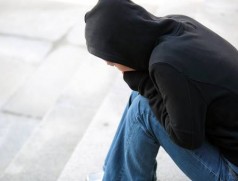A flat, a job and a life: how Alexis cheated homelessness
Martina Devlin on a happy ending in a week the nation was shocked by one man’s death in a Dublin doorway:
At 16 she finally told her mother and they alerted the authorities, leading to his imprisonment. But her home life remained troubled, even after he was no longer under the same roof. Within a few years, she was living in emergency accommodation – classified as homeless. She wasn’t even 20 at the time.
 Dublin-born Alexis (not her real name) is now just 23 and has already spent a year-and-a-half in a hostel for homeless people. She has been bounced from one place to another, with periods in a YMCA, living with her grandmother, and a prolonged stint of sleeping on friends’ sofas. When she couldn’t “kip on couches” any more, as she puts it, she wound up in that city-centre hostel.
Dublin-born Alexis (not her real name) is now just 23 and has already spent a year-and-a-half in a hostel for homeless people. She has been bounced from one place to another, with periods in a YMCA, living with her grandmother, and a prolonged stint of sleeping on friends’ sofas. When she couldn’t “kip on couches” any more, as she puts it, she wound up in that city-centre hostel.
Along the way, she developed an eating disorder and was prescribed anti-depressants.
“Sometimes I’d think: ‘Why me? Why has all this stuff happened to me?’ and there were times I thought I’d be better off living in a doorway on O’Connell Street,” she says. “I didn’t care what happened to me. I didn’t want to be a burden on everybody else. But fortunately I never ended up sleeping rough.”
Alexis is a bright girl, very mannerly, and keen to better herself. She likes fashion, hanging out with friends, and watching Doctor Who on television. She’s not so different to other 23-year-olds, except in the hard knocks already taken by her – experiences she ought to have been protected against. Inevitably, they have left her somewhat cautious. But she has a positive attitude, with ambitions to work, earn money, save up, and make a comfortable home for herself – those years of temporary accommodation mean she places a high value on her living space.
However, she could easily have fallen through the cracks. What’s frightening about Alexis’s story is how quickly she became marginalised. Fortunately, a hard-working organisation called Business in the Community has intervened in her case, as in others, helping her to gain a toehold in the workplace. With its help, she was offered a four-week work placement with a Dublin retailer – one of a number of socially responsible businesses which seek to make a difference in the community by giving sidelined individuals a chance. Homeless people and immigrants are among those helped towards employment by the initiative.
To Alexis’s delight, when her placement ended recently she was kept on for the Christmas period. Now she has her fingers crossed for a permanent position. Her face lights up at the possibility: “It would be awesome, a job I really love.”
As part of the process of preparing for the placement, she did a mock job interview and received feedback from Business In The Community.”It was my first ever job interview and I actually had to tell myself to breathe. But I remembered what they told me in the feedback, and that helped,” she says.
Now living in a studio apartment, she has travelled a long way from those 18 months in the hostel, when she felt “forgotten about” by the system. The hostel was intended as a temporary measure but one month stretched into another. It was no place for a young girl, yet she points out that the staff did their best.
“I had a bedroom and bathroom with a shared kitchen, which I didn’t feel able to use – all the food was locked away or it would be stolen, and it felt unsafe there because of the drugs addicts who used it. It never felt like home. How could it? There was an 11.30pm curfew and random room inspections looking for drugs. But the curfew didn’t matter too much to me because for a time I was petrified to leave my room.”
Alexis had been a good student, but had dropped out before sitting her Leaving Cert. In the hostel, she decided to study for the exam (she passed it), and the staff allocated a large room to her which could fit a desk.
“I saved up €35 for a desk and chair I bought second-hand, and I gave the driver €5 for petrol to deliver it,” she says. She’s a determined saver: a TV is the next goal.
Her overall plan is to “get married and move into the middle of the country”. But she hopes she can continue working, not just for the money but the social interaction and sense of being part of something. Here’s what she says about having a job: “I like the other staff, they are very patient with me. I like the public – meeting new people and helping customers. I like everything about the job.”
To some, it might not sound like much. But it gives Alexis that all-important chance in life. She no longer feels forgotten.
Business In The Community believes employment is the key to minimising social disadvantage. Participating companies include Debenhams, Marks&Spencer, Tesco, Boots, Compass and KPMG. Other businesses, large and small, are urged to follow their example: such schemes can change the course of people’s lives.
Source: The Independent News & Media, Writer: Martina Devlin


